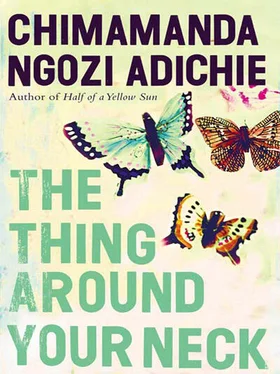She dated married men before Obiora — what single girl in Lagos hadn’t? Ikenna, a businessman, had paid her father’s hospital bills after the hernia surgery. Tunji, a retired army general, had fixed the roof of her parents’ home and bought them the first real sofas they had ever owned. She would have considered being his fourth wife — he was a Muslim and could have proposed — so that he would help her with her younger siblings’ education. She was the ada , after all, and it shamed her, even more than it frustrated her, that she could not do any of the things expected of the First Daughter, that her parents still struggled on the parched farm, that her siblings still hawked loaves of bread at the motor park. But Tunji did not propose. There were other men after him, men who praised her baby skin, men who gave her fleeting handouts, men who never proposed because she had gone to secretarial school, not a university. Because despite her perfect face she still mixed up her English tenses; because she was still, essentially, a Bush Girl.
Then she met Obiora on a rainy day when he walked into the reception area of the advertising agency and she smiled and said, “Good morning, sir. Can I help you?” And he said, “Yes, please make the rain stop.” Mermaid Eyes, he called her that first day. He did not ask her to meet him at a private guesthouse, like all the other men, but instead took her to dinner at the vibrantly public Lagoon restaurant, where anybody could have seen them. He asked about her family. He ordered wine that tasted sour on her tongue, telling her, “You will come to like it,” and so she made herself like the wine right away. She was nothing like the wives of his friends, the kind of women who went abroad and bumped into each other while shopping at Harrods, and she held her breath waiting for Obiora to realize this and leave her. But the months passed and he had her siblings enrolled in school and he introduced her to his friends at the boat club and he moved her out of the self-contained in Ojota and into a real flat with a balcony in Ikeja. When he asked if she would marry him, she thought how unnecessary it was, his asking, since she would have been happy simply to be told.
Nkem feels a fierce possessiveness now, imagining this girl locked in Obiora’s arms, on their bed. She puts the phone down, tells Amaechi she will be right back, and drives to Wal-greens to buy a carton of texturizer. Back in the car, she turns the light on and stares at the carton, at the picture of the women with tightly curled hair.
Nkem watches Amaechi slice potatoes, watches the thin skin descend in a translucent brown spiral.
“Be careful. You are peeling it so close,” she says.
“My mother used to rub yam peel on my skin if I took away too much yam with the peel. It itched for days,” Amaechi says with a short laugh. She is cutting the potatoes into quarters. Back home, she would have used yams for the ji akwukwo pottage, but here there are hardly any yams at the African store — real African yams, not the fibrous potatoes the American supermarkets sell as yams. Imitation yams, Nkem thinks, and smiles. She has never told Amaechi how similar their childhoods were. Her mother may not have rubbed yam peels on her skin, but then there were hardly any yams. Instead, there was improvised food. She remembers how her mother plucked plant leaves that nobody else ate and made a soup with them, insisting they were edible. They always tasted, to Nkem, like urine, because she would see the neighborhood boys urinating on the stems of those plants.
“Do you want me to use the spinach or the dried onugbu , madam?” Amaechi asks. She always asks, when Nkem sits in as she cooks. Do you want me to use the red onion or the white? Beef broth or chicken?
“Use whichever you like,” Nkem says. She does not miss the look Amaechi darts her. Usually Nkem will say use that or use this. Now she wonders why they go through the charade, who they are trying to fool; they both know that Amaechi is much better in the kitchen than she is.
Nkem watches as Amaechi washes the spinach in the sink, the vigor in Amaechi’s shoulders, the wide solid hips. She remembers the shy, eager sixteen-year-old Obiora brought to America, who for months remained fascinated by the dishwasher. Obiora had employed Amaechi’s father as a driver, bought him his own motorcycle and said Amaechi’s parents had embarrassed him, kneeling down on the dirt to thank him, clutching his legs.
Amaechi is shaking the colander full of spinach leaves when Nkem says, “Your oga Obiora has a girlfriend who has moved into the house in Lagos.”
Amaechi drops the colander into the sink. “Madam?”
“You heard me,” Nkem says. She and Amaechi talk about which Rugrats character the children mimic best, how Uncle Ben’s is better than basmati for jollof rice, how American children talk to elders as if they were their equals. But they have never talked about Obiora except to discuss what he will eat, or how to launder his shirts, when he visits.
“How do you know, madam?” Amaechi asks finally, turning around to look at Nkem.
“My friend Ijemamaka called and told me. She just got back from Nigeria.”
Amaechi is staring at Nkem boldly, as though challenging her to take back her words. “But madam — is she sure?”
“I am sure she would not lie to me about something like that,” Nkem says, leaning back on her chair. She feels ridiculous. To think that she is affirming that her husband’s girlfriend has moved into her home. Perhaps she should doubt it; she should remember Ijemamaka’s brittle envy, the way Ijemamaka always has something tear-her-down to say. But none of this matters, because she knows it is true: a stranger is in her home. And it hardly feels right, referring to the house in Lagos, in the Victoria Garden City neighborhood where mansions skulk behind high gates, as home. This is home, this brown house in suburban Philadelphia with sprinklers that make perfect water arcs in the summer.
“When oga Obiora comes next week, madam, you will discuss it with him,” Amaechi says with a resigned air, pouring vegetable oil into a pot. “He will ask her to move out. It is not right, moving her into your house.”
“So after he moves her out, then what?”
“You will forgive him, madam. Men are like that.”
Nkem watches Amaechi, the way her feet, encased in blue slippers, are so firm, so flatly placed on the ground. “What if I told you that he has a girlfriend? Not that she has moved in, only that he has a girlfriend.”
“I don’t know, madam.” Amaechi avoids Nkem’s eyes. She pours onion slices into the sizzling oil and backs away at the hissing sound.
“You think your oga Obiora has always had girlfriends, don’t you?”
Amaechi stirs the onions. Nkem senses the quiver in her hands.
“It is not my place, madam.”
“I would not have told you if I did not want to talk to you about it, Amaechi.”
“But madam, you know, too.”
“I know? I know what?”
“You know oga Obiora has girlfriends. You don’t ask questions. But inside, you know.”
Nkem feels an uncomfortable tingle in her left ear. What does it mean to know, really? Is it knowing — her refusal to think concretely about other women? Her refusal to ever consider the possibility?
“Oga Obiora is a good man, madam, and he loves you, he does not use you to play football.” Amaechi takes the pot off the stove and looks steadily at Nkem. Her voice is softer, almost cajoling. “Many women would be jealous, maybe your friend Ijemamaka is jealous. Maybe she is not a true friend. There are things she should not tell you. There are things that are good if you don’t know.”
Читать дальше











